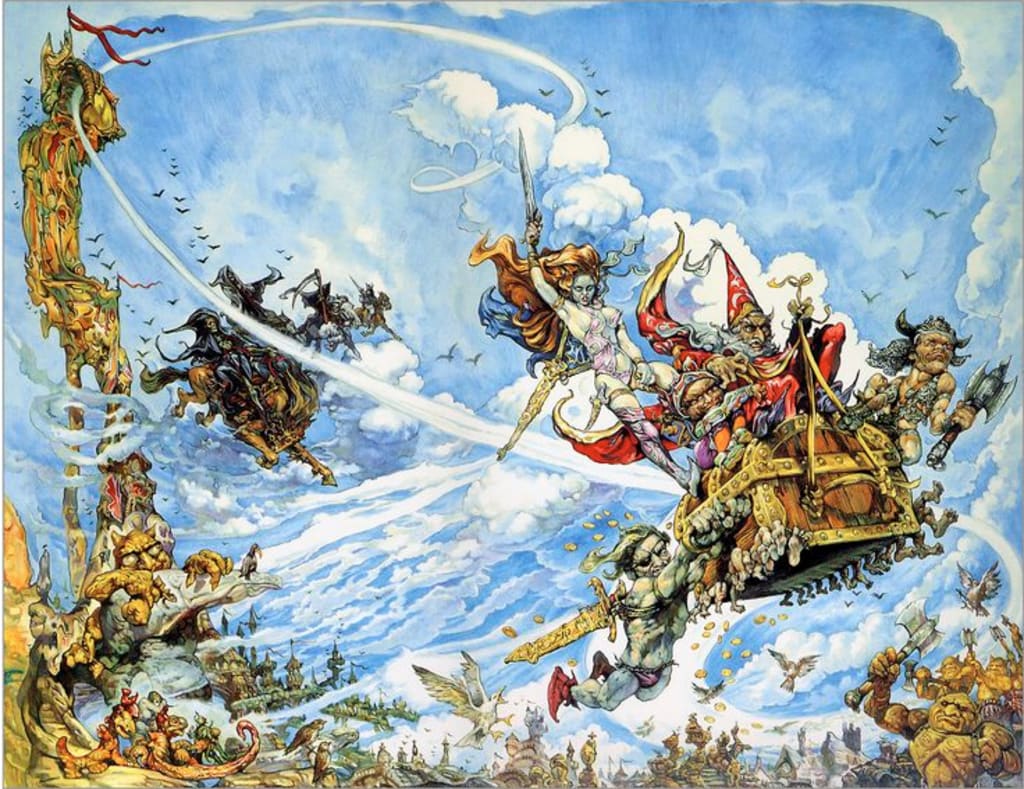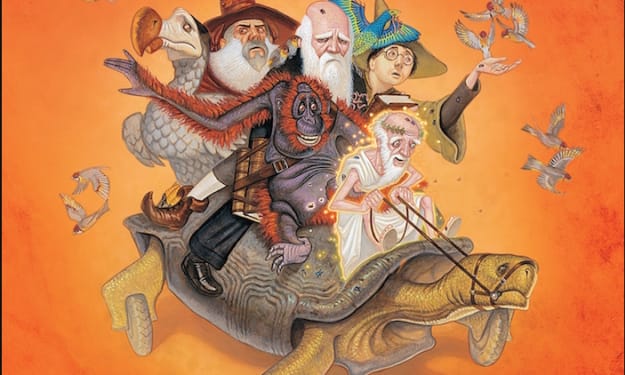Nolan Reviews: 'The Light Fantastic' (1986) by Terry Pratchett
A Discworld Retrospective Continued

One man, one goal, 41 absurdist fantasy novels. Join me in my quest to spend this year reviewing each and every novel in the Discworld series. If this is the first review you're seeing, here is the previous review.
I talked a lot last week about how The Color of Magic is a pretty unremarkable first entry into one of the most popular series of all time Honestly, I would not have continued on with the series if not for the fact that I really liked the Pratchett/ Neil Gaiman collaboration, Good Omens, and I already owned the next book in the series. So...it's really lucky for me that The Light Fantastic is so good. How exactly does the novel build itself up to being so good? By pivoting on most of the things established in the first novel.
As mentioned in the previous review, the first book ends on a cliffhanger in which our main characters leave The Discworld. This idea is immediately backed off of in the sequel and our main cast is magically transported back onto The Discworld (for somewhat contrived reasons having to do with the plot's MacGuffin of a magical, forbidden spell that's been residing in Rincewind's head since his school days). This move on Pratchett's part is so important because it's a realization of what did and did not work in his series. The path he set things on would have set up a series where, presumably, the characters of Rincewind and Twoflower jump from wacky world to wacky world having adventures, inherently focusing on them and their adventures as the draw. Now, Rincewind is an excellent character...but he's not strong enough to pull that much story focus. And, in fact, the character ends up being used rather sparingly from here on out, only having prominent roles in 8 of the 41 novels. The real draw of the series is The Discworld itself.
This book structures itself completely differently as well, taking on the narrative form that I most associate with Pratchett's writing. No longer do we have chapters but short scenes divided by simple page breaks, emulating more the style of a film constantly jumping from location to location. The cast also greatly expands. In the first novel, things were kept pretty close to the two leads with side characters flitting in and out of the story to never be referenced again. In this one, though, it's pretty much an ensemble comedy. There are, at points, five or six plot lines that you have to keep track of as they are being cut between and all of them are really fun and don't overstay their welcome, constantly intersecting with each other as the story comes to a grand crescendo of madness. That's what I live for with these books.
That does bring me, though, to a problem that the series will more or less continue to have until Guards! Guards! down the line, and I just want to talk about it now so that I don't have to mention it again. The climactic sequences are often very hard to conceptualize. Pratchett loves to get philosophical with his story conclusions by centering them on thinking about the way that we think and using a little trick or idea about how we think to get the good guys out of trouble at the end. I love that and he uses it really well in later novels. Here though, and in several other early novels in the series, it manifests in the characters slipping into an alternate dimension and then a bunch of confusing stuff happening that I, at least, have a hard time following.
The final fifty pages of the book, though, are pure beauty after the proper plot wraps up. As Twoflower and Rincewind part ways, it feels like Pratchett giving an extended goodbye to the story that he thought that he was telling and honestly gives me chills every time I read it.
Tune in next week to see where Pratchett takes the series without it's two presumed leads...
PS: I couldn't really justify dedicating time to this in the actual review because the character doesn't have much in the way of plot relevance here, but this book does also introduce my favorite character in all of Discworld with The Librarian, a wizard turned orangutan. My Twitter (@NolanNightinga3) is currently devoted to this absolute icon.





Comments
There are no comments for this story
Be the first to respond and start the conversation.